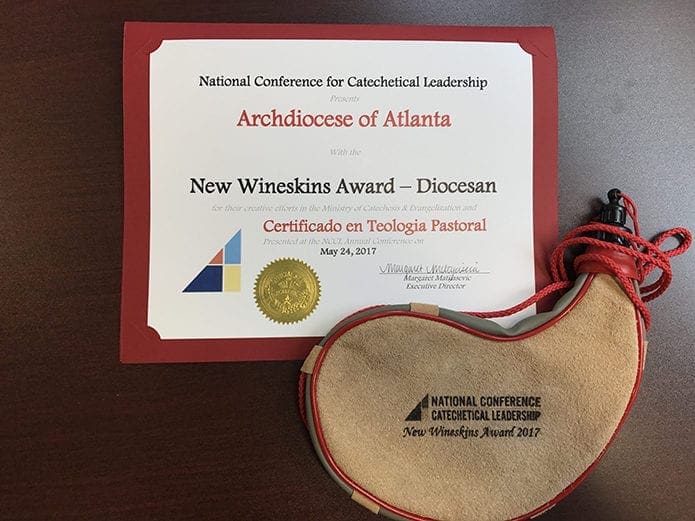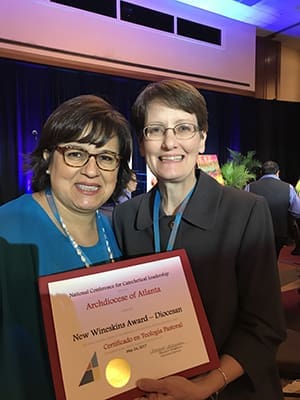
Atlanta
Creative Atlanta program training Spanish catechists garners national honor
By PRISCILLA GREEAR, Special to the Bulletin | Published August 3, 2017 | En Español
ATLANTA—The Archdiocese of Atlanta received the New Wineskins Award for its innovative Spanish certificate program in pastoral theology taking place in partnership with the University of Dallas.
The award was given at the 81st National Conference for Catechetical Leadership, held in Dallas May 22-25.
The online study program was created to form leaders and strengthen the Spanish catechetical foundation in the Atlanta Archdiocese where 61 of 109 parishes and missions offer Mass in Spanish and nearly half of all Catholics are Hispanic.
The three-year certificate program in pastoral theology is now in its fourth year and currently has 58 students starting their third semester in the fall. Thus far 124 have graduated and gone on to catechize and evangelize the faithful of their parishes from Gainesville to Jonesboro and fortify Hispanic ministries across the archdiocese.
Amy Daniels, director of the archdiocesan Office of Formation and Discipleship, and associate director Monica Oppermann accepted the award at the conference. Each year the award recognizes a U.S. diocese for a program with three years of proven success in catechesis and evangelization—regardless of language format.
“It’s a wonderful recognition, a first-class recognition the diocese is getting for the effort. And also they mentioned that they had not seen anything of this nature for the Hispanic community. As Archbishop (Wilton D.) Gregory said at the last graduation, it’s for the people who speak to God in Spanish,” Oppermann said.
The award shows “how important our Hispanic population is for our archdiocese. That is the reason we are really focused on this program.”
The program also stood out for its partnership with the Dallas University Ann and Joe O. Neuhoff School of Ministry.
“One of the characteristics they liked about the innovation is we went outside of ourselves, we relied on a great university,” said Oppermann. “We are forming these people and pastors are very happy. … We try to form them in theology and knowledge of the faith and also we’re giving them the pastoral tools to minister.”
The program fulfills the mission of the Office of Formation and Discipleship to “equip Catholic leaders in service to the parishes and missions of the archdiocese.”
“The award is affirmation that the initiative, designed to benefit our parishes by making quality ministry formation in Spanish accessible to their leaders, is a success,” said Daniels in an email.
90 percent retention rate
In the fall and spring semesters, students take two theological classes and one pastoral course over 15 weeks, watching a weekly video lecture and completing assignments. Classes range from Scripture and church history to prayer and spirituality. The certificate is comprehensive but less demanding than a degree program, requiring a high school diploma and meeting requirements for master catechist certification.
A UD professor kicks off each semester with a class at the Chancery in Smyrna where students attend Mass and receive books. Class members are also divided geographically for online discussion and optional study, prayer and fellowship. The directors believe that the program’s online format, personal and spiritual support and community engagement make for its winning combination—and 90 percent retention rate.
The online flexibility is key as many Hispanic ministry leaders work on Saturdays, have family obligations or lack transportation to the Chancery.

Monica Oppermann, left, associate director, and Amy Daniels, director of the archdiocesan Office of Formation and Discipleship, accepted the New Wineskins Award for the archdiocese’s Spanish certificate program in pastoral theology. The award was given at the 81st National Conference for Catechetical Leadership, held in Dallas May 22-25.
Oppermann monitors students’ progress and provides support as needed, helping one student out with a laptop when a family crisis left her without a computer.
“They really liked our association with the university and the association with parishes and the students—that relational aspect we put into the program,” Oppermann said.
Participants range from Central American immigrants who speak Spanish exclusively to second-generation Hispanic Americans.
The archdiocese offers two scholarships per church of 40 percent tuition for members nominated by their pastor. The parish and students pay the remainder. So far, 46 of 61 parishes with Mass in Spanish have sponsored students. In addition, there are students from the Savannah Diocese and independents paying their own way.
Students take classes after work
The program was conceived out of an identified lack of available online programs in Spanish in the United States. The archdiocese launched it in 2013 after planning the program with UD’s School of Ministry as an alternative to an on-site program offered by Dallas since 2009.
UD agreed to pilot a program with a minimum enrollment of 70 students to make it viable; 73 students signed up and the program took off under the patronage of Our Lady of Guadalupe.
“There was a need for a program that prepared leaders for ministry in the United States, that included a way for students to build relationships with other parish leaders . . . and to foster ongoing theological reflection and nurture the spiritual lives of the parish leaders,” Daniels said. “The UD School of Ministry took a risk and agreed to pilot an online version of their existing certificate in pastoral theology in Spanish just for the Archdiocese of Atlanta.”
Initially doubts circulated about the online format, but students have adapted, whether working off their smartphones or Wi-Fi at parishes.
“The effort they put into their work in the field or the construction site is the same effort that they put into their faith, and we have proof of that. After working so many hours, they still come and take a class online,” Oppermann said. “This is such an affirming experience for Hispanics to show they can do it.”
Maria Costanza Romero is one of four graduates from Holy Cross Church, Atlanta, who loved studying Scripture, theology and church history in such depth for the first time. Now she joyfully and confidently shares her new knowledge and skills with the parish where she and her husband teach a class on Theology of the Body that draws over 100 participants.
An 18-year catechist, the Colombia native also coordinates Eucharistic ministers, weddings and quinceñeras, cultural celebrations of a girl’s 15th birthday.
“It’s my responsibility to share a lot of things I learned with other people at the church” and in daily life, she said. “We need more theology, to learn and teach other people. Everybody must take this course. It must be promoted more in parishes. The program is very, very good, and the teachers are very, very good for a lot of people, but many don’t know about it.”
While she earned her certificate, her studies continue.
“My interest is to learn every day about the church, God and Jesus Christ. I grew a lot. It’s been a very good experience,” she said.
“It is a needed thing”
The initiative also contributes to the goal of the Fifth National Encuentro USCCB initiative to discern ways to better respond to the Hispanic/Latino presence in the United States and encourage their participation in the new evangelization. Such outreach is essential, as Hispanics now comprise 49 percent of Catholics aged 18 to 29 in the United States, according to the Public Religion Research Institute.
“The fruits of the certificate in pastoral theology’s deliberate partnership between the pastors, the students and parish leaders, the archdiocese and the school of ministry are a direct contribution to the goal of the Fifth Encuentro. The relationship amongst the leaders, the pastors, and the diocese, built in the process of the certificate program and continuing after the leaders graduate, are key to continued conversion and support for the entire church going forward,” said Daniels.
She is grateful to the participating pastors and to Archbishop Gregory and Bishop Luis R. Zarama who “encouraged innovation, invested in and wholeheartedly supported” the initiative. Furthermore, “I’m grateful to Our Lady, who prayed for the success of the initiative and the students.”
Oppermann hopes that the program can also inspire other dioceses represented at the national catechetical conference.
“Everybody was expressing a thirst for formation programs in Spanish,” she said. “The next day we get the award. It is a needed thing. They recognize that, so we hope we could share this knowledge with whoever is interested.”